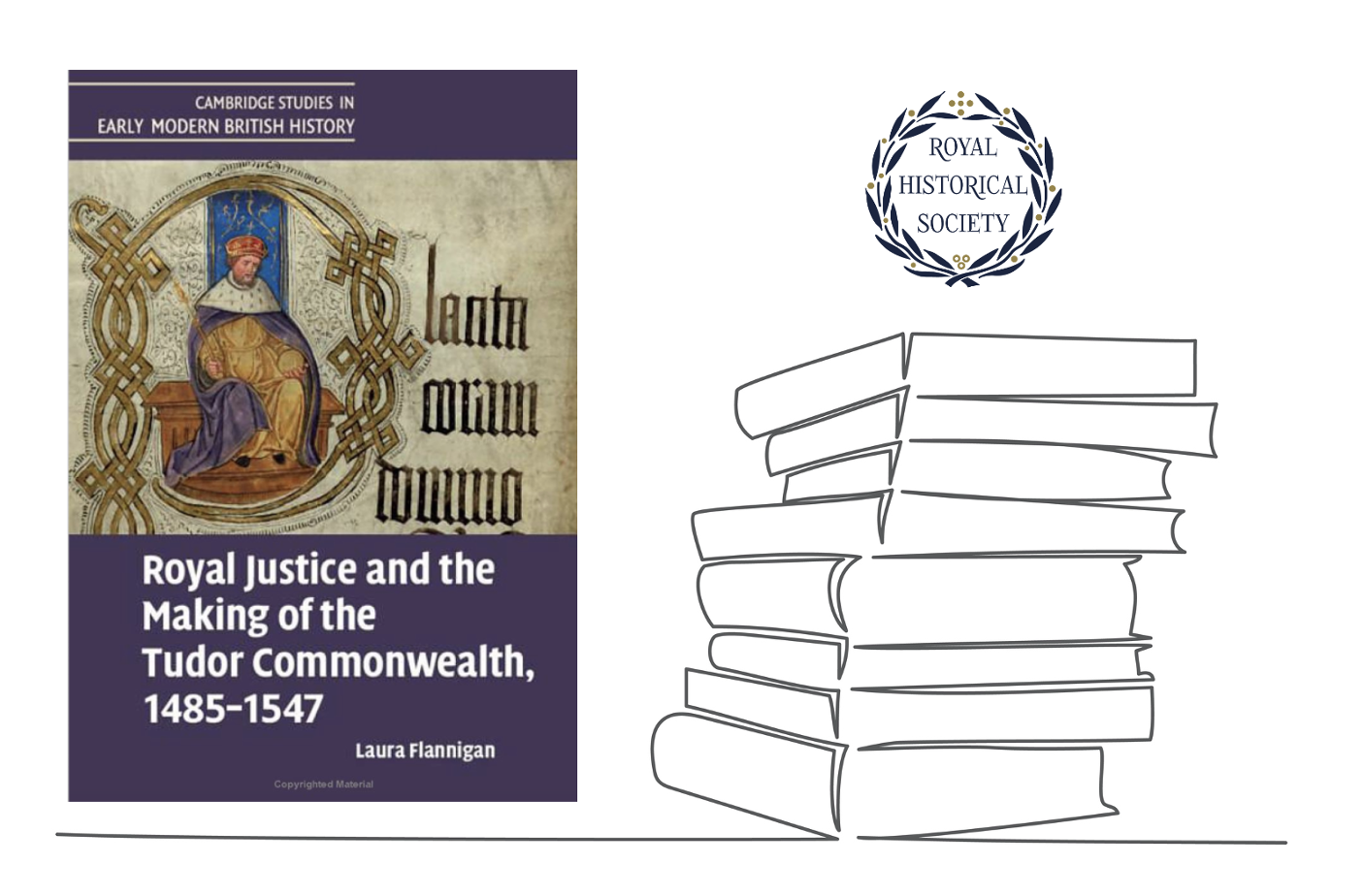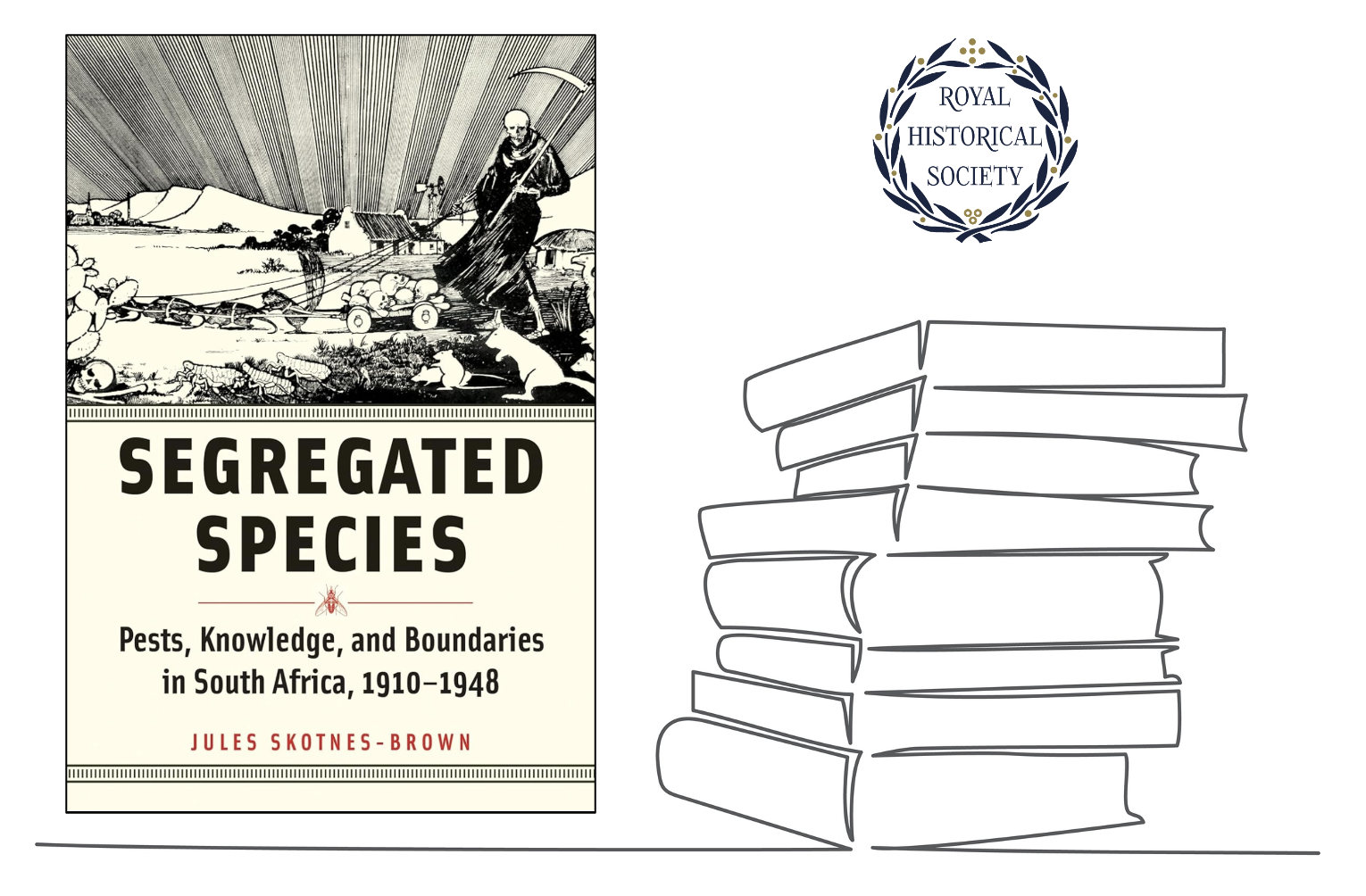
The Royal Historical Society awards an annual book prize for first monographs published by early career historians. Submissions are invited from historians who gained their PhD at a UK or Irish university. The 2025 book prize includes several new elements which are set out below:
- the move to one annual book prize — the Royal Historical Society First Book Prize — which will be awarded to early career authors of two books each year; each winning author will receive £1000;
- the submission of all monographs, on any subject area or geographical region, to the new format First Book Prize
- books will be received for judging by self-nomination from the author. This replaces the previous model of recommendations by publishers.
2025 Prize Winners

On 2 July 2025, the Society announced the following two winners of this year’s First Book Prize:
- Royal Justice and the Making of the Tudor Commonwealth, 1485-1547, by Laura Flannigan (Cambridge University Press, 2024)
- Segregated Species: Pests, Knowledge, and Boundaries in South Africa, 1910–1948, by Jules Skotnes-Brown (Johns Hopkins University Press 2024)
Our congratulations to Laura and Jules, and to the six other authors shortlisted in 2025. For more on the winning titles, please see below.
Eligibility for the RHS First Book Prize, 2026
To be eligible for consideration for the prize, the book must:
- be an early career historian’s first sole-written history book and take the form of a monograph;
- be on any historical subject, covering all topics, chronologies and geographies;
- be an original and scholarly work of historical research by an author who received their doctoral degree from a UK or Irish university;
- have been published in English during the calendar year 2024 (for the 2025 award). Only printed and e-books bearing a 2025 copyright date are eligible for consideration in the current round. Books issued by publishers in the final weeks of 2025, which bear a copyright date of 2025, will be eligible for nomination in the 2025 awards.
- be a publication from a recognised academic or university press, or a publisher of academic monographs in history.
Submitting your book to the RHS First Book Prize, 2026
From 2026, entries for the Book Prize are via self-nomination by the author. The call for submission will open on 1 September 2025 and close on 30 November 2025 The process for submission is as follows:
- eligible authors whose books qualify for the 2026 prize should submit an application via the RHS applications platform (open 1 September to 31 December 2025).
- at this stage, applicants will be asked to provide information about their book (title, date of publication, publisher, etc.).
- when submitting an application to the RHS First Book Prize, you will be required to upload a copy of the ‘Introduction’ or introductory chapter of the monograph as a pdf or via a link to an online edition. Options to provide further content from the monograph, if possible, are also available.
- all submissions will then be reviewed by the judging panel to create a long-list. Print copies of long-listed books will be requested from their respective publishers by the RHS and allocated to the judging panel.
- judging then takes place leading to the creation of a Shortlist of eight titles, from which two final winners of the RHS First Book Prize will be chosen. The award of the next round of book prizes is expected to occur in July 2026.
Winners of the 2025 book prize
Laura Flannigan for Royal Justice and the Making of the Tudor Commonwealth, 1485-1547 (Cambridge University Press, 2024)
 Judges’ citation:
Judges’ citation:
This is an impressive, conceptually adept and ambitiously argued book. It is grounded in extraordinarily deep archival research on a previously neglected judicial court that was established in the late fifteenth century.
Drawing on thousands of case files, the book explores what constituted the evolving and ambiguous categories of royal justice and poverty. The court has been called the poor man’s court and Flannigan shows that there is much merit in this description, whilst also showing that poverty was something of a relative term.
The work gives fresh insights into state formation in the early Tudor state by examining the responsiveness of this itinerant court to petitions from litigants and hence gives fascinating social depth to the emergence and development of government and legal culture. It also argues that the people ‘invited the state in’ much earlier than has often been thought: ‘justice’, Flannigan argues, was created collaboratively.
The rich quantitative data yields intriguing vignettes that give wonderful colour to institutional history – for example, we hear at one point about a number of defendants who ate the seals of the writs issued against them in an unsuccessful bid to avoid answering them! The book is clearly written and structured, as well as being cleverly and convincingly argued.
Professor Mark Knights, chair, RHS First Book panel, 2025
Jules Skotnes-Brown for Segregated Species: Pests, Knowledge, and Boundaries in South Africa, 1910–1948 (Johns Hopkins University Press 2024)

Judges’ citation:
This is a fascinating, original, highly engaging, conceptually smart and extremely well-written interdisciplinary study that combines the history of science with its much wider social, political and racial context. It integrates animal and human history to powerful effect by considering what or who constitutes a ‘pest’ and how non-pests should be protected.
The book successfully argues that the control of ‘pests’ (always a controverted category) involved the creation of physical and conceptual boundaries that helped to confine or preserve positively regarded animals and humans. Its argument is carefully drawn and shocking at times in its implications, given the correlation that is drawn, especially in the final chapter, between attitudes to pests and to humans.
The book challenges historians to look beyond the realm of human relations and to to see how the histories of elephants, rodents, wild birds and even small organisms interacted with, and at times even helped to shape, human perceptions, reactions and policies.
The work touches in interesting ways on the history of conservation, ideologies of categorisation, social and racial tensions, and the ambiguous status of ‘native knowledge’. This rich book is impressively researched, nimble in its analysis, successfully experimental at times in its approach and superbly written.
Professor Mark Knights, chair, RHS First Book panel, 2025
A full listing of winners of the Royal Historical Society’s first book prizes (1977-2025), previously known as the Whitfield and Gladstone prizes, is available here.
General enquiries about Society’s Prizes should be sent to: administration@royalhistsoc.org.
IMAGE: ‘Books and Scholars’ Possessions’, Korean, early C20th, Metropolitan Museum of Art Collections, public domain
